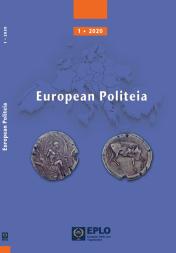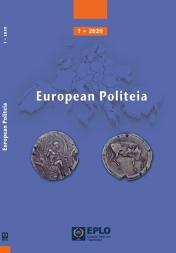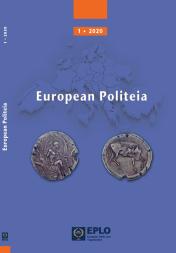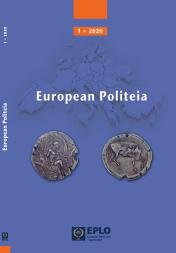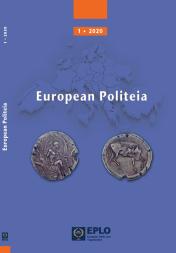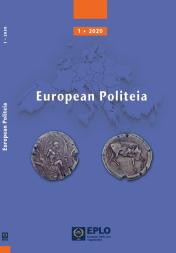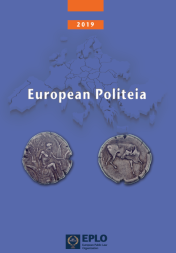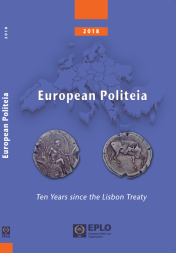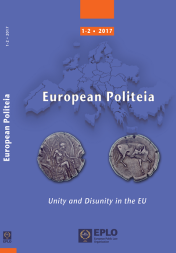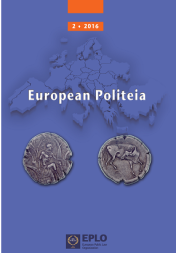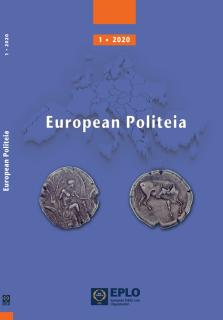
EUROPEAN POLITEIA 1/2020
Six articles, coming from Greece and the United Kingdom, are included in the first issue of the year 2020 of the European Politeia.
The first paper of this issue attempts to answer what it means for a cluster of ‘politeiai’ to form and sustain a union for their collective symbiosis, even to combine into a larger ‘politeia’ through the lens of ‘syspondia’; a bond shared among diverse coevolving parts to a political association, each forming a unity of its own but all aspiring to a shared life as in Europe’s late-modern ‘syspondia’. The second article is concerned with the substantial scientific debate about the impact of Investor State Dispute Settlement mechanisms on the dynamic notion of ‘autonomy’ of the EU legal order initiated by Opinion 1/17, exploring the critical points in the CJEU’s arguments in view of recent developments and highlighting the fundamental goal to preserve the autonomy of EU legal order while exploring the pathway to reconcile the need for an autonomous ‘self-dependence’ of the Union’s legal system and the need for conciliation in the field of international investment arbitration. Following the latest legal and political developments within the United Kingdom and the divergent responses to the COVID-19 pandemic across the UK Nations, the third article maps proposed new UK constitutional reforms and shifting constitutionalism paradigms; and how asymmetrical quasi-federalism is now becoming likely if the UK Union is to endure and prosper. However, it also concludes that if Westminster relies on legal sovereignty, it has the potential to further fuel independence movements, particularly from those UK Nations that desire deeper regulatory alignment with the EU. The fourth article proceeds to a thorough examination of the entirely new meaning that the EU Global Strategy (EUGS) has gained in the scope of “Brexit”. The EUGS is a guideline to insure a continuous “hunt” of a liberal era with rule of law-based international order; a yearlong review and drafting cycle concluded with the completion of the EUGS. It also represents the latter in the evolution of the EU’s growth, refining and developing its reputation as an international actor, along with the form of contribution it intends to bring to the legal international order. The following article examines the new, rather ambiguous parameter for the election of the Commission’s President set by Article 17, para. 7 TEU: the results of the elections to the European Parliament. The aim of this paper is to support the lead candidate system as it is in line with the well-established common constitutional tradition of parliamentary republic and strengthens the concept of European identity which consists a fundamental aim of the Treaties. Last but not least, the author of the sixth article aims to examine Transatlantic relations in the field of defense and their subsequent interactions in the post-Brexit era. The United States under President Biden is moving in towards NATO reconciling their relationship, meanwhile European and Transatlantic relations are affected by the United Kingdom’s exit from the European Union. In a parallel manner, three decades after the end of the Cold War, the international system has been in a constant state of change, about global redistribution of power. Under the above circumstances, the United States and their European allies will have to redefine their relations.
Summary
Dimitris N. Chryssochoou, Europe’s Late-Modern ‘Syspondia’: A Genus Reduction [IN ENGLISH]
Antonis Metaxas, Reconsidering the Autonomy of EU Law - From Achmea to Opinion 1/17 and Beyond [IN ENGLISH]
Vasileios Kottas, European Union’s Global Strategy in a Post-Brexit Era [IN ENGLISH]
Konstantinos Margaritis, Article 17, para. 7 TEU and the Spitzenkandidaten Process [IN ENGLISH]
Christos Ziogas, American Expectations regarding Transatlantic Defense in the Post-Brexit Era [IN ENGLISH]















